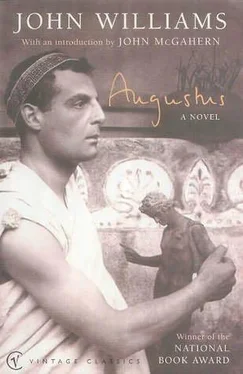John Williams - Augustus
Здесь есть возможность читать онлайн «John Williams - Augustus» весь текст электронной книги совершенно бесплатно (целиком полную версию без сокращений). В некоторых случаях можно слушать аудио, скачать через торрент в формате fb2 и присутствует краткое содержание. Жанр: Историческая проза, на английском языке. Описание произведения, (предисловие) а так же отзывы посетителей доступны на портале библиотеки ЛибКат.
- Название:Augustus
- Автор:
- Жанр:
- Год:неизвестен
- ISBN:нет данных
- Рейтинг книги:3 / 5. Голосов: 1
-
Избранное:Добавить в избранное
- Отзывы:
-
Ваша оценка:
- 60
- 1
- 2
- 3
- 4
- 5
Augustus: краткое содержание, описание и аннотация
Предлагаем к чтению аннотацию, описание, краткое содержание или предисловие (зависит от того, что написал сам автор книги «Augustus»). Если вы не нашли необходимую информацию о книге — напишите в комментариях, мы постараемся отыскать её.
Augustus — читать онлайн бесплатно полную книгу (весь текст) целиком
Ниже представлен текст книги, разбитый по страницам. Система сохранения места последней прочитанной страницы, позволяет с удобством читать онлайн бесплатно книгу «Augustus», без необходимости каждый раз заново искать на чём Вы остановились. Поставьте закладку, и сможете в любой момент перейти на страницу, на которой закончили чтение.
Интервал:
Закладка:
I suspect that I have admired the poets because they seemed to me the freest and therefore the most affectionate of men, and I have felt a closeness to them because I have seen in the tasks that they set for themselves a certain similarity to the task that long ago I set for myself.
The poet contemplates the chaos of experience, the confusion of accident, and the incomprehensible realms of possibility -which is to say the world in which we all so intimately live that few of us take the trouble to examine it. The fruits ofthat contemplation are the discovery, or the invention, of some small principle of harmony and order that may be isolated from that disorder which obscures it, and the subjection ofthat discovery to those poetic laws which at last make it possible. No general ever more carefully exercises his troops in their intricate formations than does the poet dispose his words to the rigorous necessity of meter; no consul more shrewdly aligns this faction against that in order to achieve his end than the poet who balances one line with another in order to display his truth; and no Emperor ever so carefully organizes the disparate parts of the world that he rules so that they will constitute a whole than does the poet dispose the details of his poem so that another world, perhaps more real than the one that we so precariously inhabit, will spin in the universe of men's minds.
It was my destiny to change the world, I said earlier. Perhaps I should have said that the world was my poem, that I undertook the task of ordering its parts into a whole, subordinating this faction to that, and adorning it with those graces appropriate to its worth. And yet if it is a poem that I have fashioned, it is one that will not for very long outlive its time. When Vergil died, he earnestly beseeched me to destroy his great poem; it was not complete, he said, and imperfect. Like a general who sees a legion destroyed and does not know that two others have triumphed, he thought himself to be a failure; and yet his poem upon the founding of Rome will no doubt outlast Rome itself, and certainly it will outlast the poor thing that I have put together. I did not destroy the poem; I do not believe that Vergil thought I would. Time will destroy Rome.
My fever has not abated. An hour ago, I had a sudden attack of dizziness and a sharp pain in my left side, followed by a numbness. I discover that my left leg, always a little weak, is now hardly capable of movement. It will still support my weight, but it drags beneath me uselessly; and when I prick it with my stylus there is the merest ghost of a pain.
I still have not informed Philippus of my condition; there is nothing that he can do to relieve my condition, and I should prefer not to humiliate him by forcing him to perform vain solicitudes upon a body whose deterioration is far beyond the reach of any ministrations he might attempt. After all these years, I cannot be angry at a body that fails; despite its weakness, it has served me well; and it is perhaps appropriate that I should attend its demise, as I might attend the death of an old friend, remembering as the soul slips away into whatever immortality it might find, the mortal soul which could not in life separate itself from the animal that was its guest. I am able now, and have been for some months, almost to detach myself from the body that contains me and observe this semblance of myself. It is not an ability altogether new, and yet it seems to me now that it is more natural than it has been before.
And so, detached from a failing body, almost oblivious to the pain that now is its habitation, I float above the unimaginable sea southward toward Capri. The high sun glints upon the water that parts before our prow, the white foam hisses as it spreads and disperses upon the waves. I shall rest from my task, and perhaps some of my strength will return. This evening we harbor at Puteoli. And tomorrow we shall land at Capri, where I shall perform what might be the last of my public functions.
We are at harbor. It is early afternoon, and the mists have not yet blurred the coastal lands from the sight of the sea voyager. I remain at my table, and occupy my leisure with this letter. I believe that Philippus, who continues to watch me from his station at the prow of our ship, has begun to suspect that the condition of my health has sharply worsened. A look of doubt has settled upon his fine young face, and his hazel eyes beneath the brows that are straight and delicate as a woman's glance at me from time to time. I do not know how much longer I shall be able to conceal my condition from him.
We have dropped anchor at a little cove just north of Puteoli; and farther north is Naples, where some years ago Marcus Agrippa constructed a causeway between the sea and the Lucrine Lake, so that the Roman fleet might conduct its maneuvers safe from the vicissitudes of weather and the pirate fleets of Sextus Pompeius. At one time, as many as two hundred war ships trained upon that inland harbor, and thus became capable of defeating Sextus Pompeius and saving Rome. But during these years of peace, silt has been allowed to clog the entrance to this training ground; and now I understand that it has been turned into an oyster bed so that the Roman rich might have the pleasures of their new existences enhanced. From where we are anchored, I cannot see this harbor, and I am just as pleased that I cannot.
In recent years the possibility has occurred to me that the proper condition of man, which is to say that condition in which he is most admirable, may not be that prosperity, peace, and harmony which I labored to give to Rome. In the early years of my authority, I found much to admire in my countryman; in the midst of privation he was uncomplaining and sometimes almost gay, in the midst of war he had more care for the life of a comrade than he did for his own, and in the midst of disorder he was resolute and loyal to the authority of Rome, wherever he thought that authority might lie. For more than forty years we have lived the Roman peace. No Roman has fought Roman, no barbarian foot has trod in unchallenged enmity upon Italian soil, no soldier has been forced to bear arms against his will. We have lived the Roman prosperity. No person in Rome, however lowly, has gone without his daily ration of grain; the provincial citizen is no longer at the mercy of famine or natural disaster, but may be sure of aid in any extremity; and any citizen, whatever his birth, may become as rich as his endeavor and the accidents of the world allow him. And we have lived the Roman harmony I organized the courts of Rome so that each man might go before a magistrate with some assurance of receiving at least a modicum of justice; I codified the laws of the Empire, so that even the provincial might live in some security from the tyranny of power or the corruption of greed; and I made the state secure against the brutal force of ambitious power by instituting and enforcing those laws against treason that Julius Caesar had promulgated before his death.
And yet there is now upon the Roman face a look which I fear augurs badly for his future. Dissatisfied with honest comfort, he strains back toward the old corruption which nearly robbed the state of its existence. Though I gave the people freedom from tyranny and power and family, and freedom to speak without fear of punishment, nevertheless the dictatorship of Rome was offered to me by both the people and the Roman Senate, first when I was absent in the East, following the defeat of Marcus Antonius at Actium, and later during the consulship of Marcus Marcellus and Lucius Arruntius, after I had saved Italy, at my own expense, from that famine which destroyed the grain supply of Italy. Upon neither occasion did I accept, though I incurred the displeasure of the people. And now the sons of senators, who might be expected to serve their fellow men or even themselves with some honor, clamor to hazard their lives in the arena, pitting themselves against common gladiators, for what they imagine to be the sport of danger. So has Roman bravery descended into the common dust.
Читать дальшеИнтервал:
Закладка:
Похожие книги на «Augustus»
Представляем Вашему вниманию похожие книги на «Augustus» списком для выбора. Мы отобрали схожую по названию и смыслу литературу в надежде предоставить читателям больше вариантов отыскать новые, интересные, ещё непрочитанные произведения.
Обсуждение, отзывы о книге «Augustus» и просто собственные мнения читателей. Оставьте ваши комментарии, напишите, что Вы думаете о произведении, его смысле или главных героях. Укажите что конкретно понравилось, а что нет, и почему Вы так считаете.











